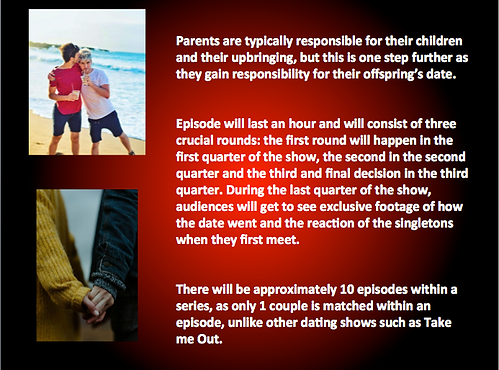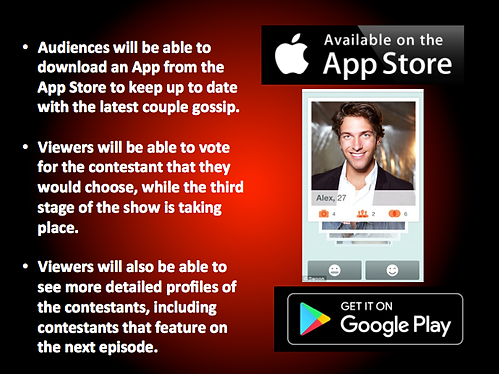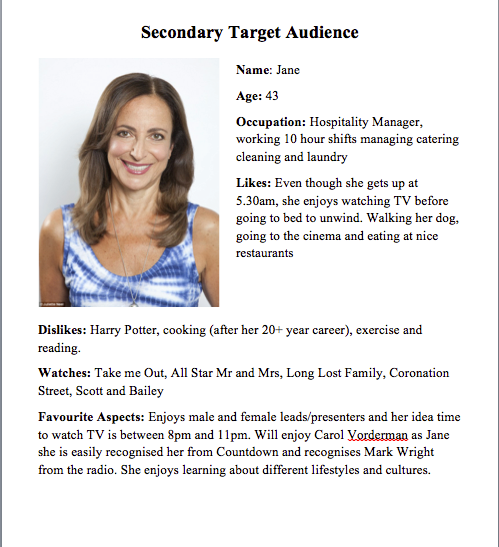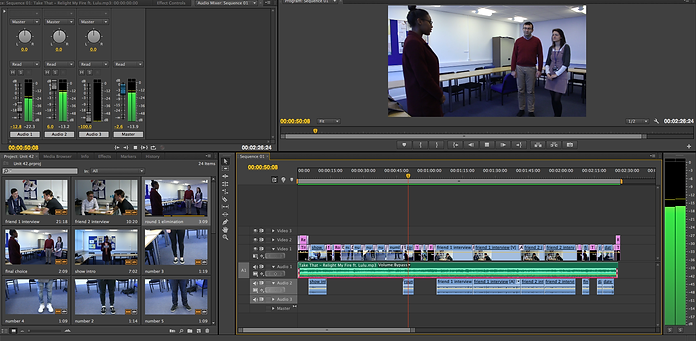My Media Portfolio
LO1- P1- Understand the structure and organisation of UK TV Broadcasting
LO2- P2/M1/D1- Be able to plan a new UK programme
Treatment











Suggested Cast


Target Audience










Legal and Ethical Issues
Music
When music wants to be used within a TV programme, permission must be granted from the music publisher who owns the song, there are only a few exceptions. The producer must claim what song they are hoping to use and give information with regards to which scene in the programme it will appear. The use of the song is also crucial information that the producer must share, for example if the song is being used as background music, sung by a character in the scene or over the credits. The type of media must also be disclaimed, for example free television, pay television or subscription etc. The producer is responsible for contacting the publisher/artist to negotiate a fee and sign a synchronization license.
Fees depend on several factors, such as the budget for the show and the popularity of the song. If a song is extremely popular, it’s going to cost a lot more for the rights to use it, as the show will be producing links to the song, and therefore getting credit for it. The time in which the song will be used is also important, and the song’s importance to the show must be considered whilst asking for rights to the content. The usage of the song will be considered as this will determine for what length of time the song will be featured, and how many times.
If the music is featuring on a free television channel, the synchronization license will enable the company to use the music on the show, and also to sell it to other countries. Many producers will often ask the artist/publisher for an “all television” synchronization license to enable them rights to the composition/music for life. This license covers all areas of TV and therefore meaning that if a show is sold to a subscription site such as Netflix, they already have permission from the owner/artist. Synchronization rights that cover all television areas usually range from $6,000 to $10,000, but the fees do not cover any home video option rights.
In our show we will be using basic sound effects for transitions between rounds, and each time we return from a commercial break. Each show will use different opening and end credit songs, for example, Relight my Fire by Take That will be used as an opening credit. It’s an upbeat song so encourages audiences to get involved and also is related to the topic of the show. Could it be Magic is also a Take That song that we could use, as again it is upbeat and also is relevant song.
Music will mainly be used for the opening and end credits, to enable the audience to make a link between the song and our show, therefore making it easily recognisable. Music will be used when the parents are entering the studio, as the contestants will already be on stage behind their boxes. Music will also be used during the end section of the show when the male presenter recaps on how the date went for the couple on the previous show. This will be upbeat music and will be fairly quiet in the background so that the audience still get the feel/mood of the date.
If our show were to get commissioned, we would be able to gain clearances by contacting the artists of the music (Take That). This would probably be via email, and would need to explain the show briefly. Sample material may also be shared with the artist to enable them to make a decision on if selling the rights to their composition is going to be beneficial to them. If they dislike the sample material and don’t think it will be popular with the general public, they are less likely to want to sell their music, as it will not increase their own personal sales etc. If they think that the show material will be a huge success, they are more than likely to want to contribute with their composition. This will not only gain them fame, as audiences will recognise them as an artist, but it may also increase profits, as people will research the song or go ahead and buy it either from sites such as Amazon/iTunes, or buy the album, again either via iTunes or purchase the actual CD.
Other Clearances
When producing a show, there are several other clearances that producers need to be aware of, to avoid copyright etc. This includes visual art, choreography, maps and audio-visual material.
Appearances from celebrities, guests and the general public music be released. Anyone who is featured and focused in a shot must be released, as well as anyone who is classed as a minor. Releases for anyone classed as a minor should be signed by the minor themselves AND a parent. If you have people of the general public that have not been released, you are still allowed to use the footage as long as they have been blurred out or are unrecognizable due to the style of editing. If any of the general public are featured without a release form, they can come forward and ask for compensation as a result of not being asked permission first. This is what the clearance will avoid.
When filming in a home, for example, camera operators must be aware of any artwork that is generally displayed on the walls etc. If the material has been produced by a family member, they may sign a release form. However, if the artwork isn’t theirs, they cannot sign a release form. In this case, the artwork must be moved or the shot must be filmed elsewhere. Blurring the section of the shot is an option, however this can still cause issues with the owner and therefore its best to avoid doing this. Photographs of people such as family members can be shown if all the relevant release forms have been completed. If they haven’t, the photos must be blurred in post-production. If the photo has been professionally taken, the family cannot sign the release form. Similarly to the artwork, the owner must give consent; otherwise it cannot feature in the shot.
With regards to locations, signage must be visible- it must be large and prominent at the entrance of the venue. The camera operator is responsible for getting footage to prove that signage was used. This must consist of the location, with a pan to the signage, then back to the main location. Locations must be released for every location used in production. If a permit is required, this should be as an addition to the signed location release. The release must be signed by the owner of the property, and must be signed before you shoot. Insurance certificates must also be provided as a condition of signing the location release.
National brands should be avoided in all situations, such as McDonalds, Coca-Cola and Toyota. This includes clothing that features within the shot, as permissions will be needed for that, and therefore it is best for it to be avoided.
If our show were to be commissioned, we would ensure that there was no photography/artwork in the studio to avoid copyright issues. We would also ensure that everyone featuring in the show has completed a release form. There will be no minors involved in the show, as contestants must be 18 to enter, and parents will obviously be over 18. This avoids any hassle with release forms and also works alongside the timeslot of our show, as it is after the watershed. Applicants will be instructed on the use of branded clothing etc, and will also be prepped in costume before filming; therefore there should be no issues with logos and national brands. Locations used will mainly be the studio, so release forms will automatically be protocol for hiring the studio. If as part of the show we film in a house, the owner will sign a release form to give consent to filming. This also applies to the building/company owner if we film at their workplace. For any music/sound, we will contact the artist/composer via email, if our show got commissioned.
The Ofcom Broadcasting Code
The Ofcom Broadcasting Code consists of 10 sections which set out principles, meaning and rules for broadcasters to follow. Section 7 and 8 also include a set of “practices to be followed” by broadcasters, each to not only protect the general public but also to promote media. Each section covers a different topic to ensure media content is fair and suitable for members of the general public, and is required under the Communications Act (2003) and the Broadcasting Act (1996). The Broadcasting Code covers standards in programmes, sponsorship, product placement (in TV programmes), fairness and privacy.
The first section of the Broadcasting Code ensures that anyone under the age of eighteen is protected from any harmful or offensive material that may impair their personal development. This may include drugs, smoking, nudity, sex, violence, dangerous behaviour or offensive language and is the main reason for the 9pm watershed. This means that broadcasters cannot show any programmes that include any of the listed material before 9pm. Following this section of the Broadcasting Code for our show will not be an issue, as we would like to air the show at 9pm.
Section 2 covers prevention of material that will cause harm or offense to the audience. There is no ban to material such as violence, dangerous behaviour, suicide, exorcism, hatred and abuse, however there is a limit for each programme with regards to the timeslot and channel the show is being broadcasted on. The main idea is that there is not enough content in the programme to encourage audiences to commit crime/discouraged behaviour. Even if the programme shows violence or suicide, it must not show techniques used or include essential details that could help or encourage the public to copy them.
In our show, I think it is also important to follow the Broadcasting Code with regards to section 3; the respect of religion. As this is a dating show, there will be people of different ethnic minorities and religions, and therefore believe that is it crucial that anyone appearing on the show is not racist or likely to say anything harmful or offensive to those of any religion. It is to be made clear that our show, and ITV, do not accept any form of discrimination or denomination.
Privacy is also hugely important for our show, as everyone has personal backgrounds and circumstances etc, and therefore details should be kept to a minimum in the show, including the homes and workplaces of the contestants/their friends.
Self-Regulation
ITV is currently not self-regulated; however the Independent Television Commission has demanded that when Ofcom’s broadcasting rules change, it is compulsory for ITV to introduce self-regulation. This not only applies to ITV but to all broadcasters. The ITC have completed a huge amount of research with regards to what audiences want, and have agreed that businesses should be allowed to manage themselves but still have guidance from Ofcom’s rules and broadcasting code.







Production- Meet the in-laws
Original
Re-Submission
Post-production- Editing




Pitch Run through
Final Pitch
Broadcaster demands and expectations of the broadcaster
Our show’s pitch was easy to follow as we had basic information on our PowerPoint, as well as us verbally explaining further. We used facts and statistics to support our ideas and used a consistent colour scheme to imply the genre and allow everyone to feel as if they were in the atmosphere of the show. Our budget was thorough however figures were not as clear as they could have been when presenting it. This would have been clearer if we had researched further the amount of weeks needed to produce a series of the same genre, therefore allowing us to create a total budget for the series, rather than just for a week/4 weeks. Our production schedule was suitable for the material required for our pitch and by following it we could demonstrate sample material of a good quality. We thoroughly explained that our production schedule would be on a bigger scale, however clearly demonstrated that we were organised with regards to personnel involved in the filming session, props/equipment and most importantly, time and location. The pre-production materials were split equally throughout the team and were delegated with regards to our individual strengths to allow us to produce the best quality pre-production material as possible. This also allowed us to have strength within our ideas as we were confident as a result of discussing the ideas as a team.
Our show idea was particularly relevant for ITV2 as our target audiences were suitable and common for the channel, and we scheduled the show appropriately. The 9pm watershed allowed our show to appeal to our audiences as it means that Ofcom allow slight offensive language as well as adult humour and sexual references. Our suggested cast had been considered thoroughly as we wanted presenters that had already worked for ITV or had appeared on the channel as part of an additional show. We came to the conclusion that it was important to have presenters that appealed to both target audiences, and therefore chose celebrities that had covered both TV and Radio. Both stars have featured on ITV recently, and therefore thought this would be a great persuasion technique/USP for the show, therefore increasing our potential audience. As Carol Vorderman is a mother, we believed that this would be a great way for the parents on the show to connect with her and feel at ease, but also to put a little bit of pressure on the contestants as they must face her throughout the show. ITV2 normally air a film on a Sunday night between 8 and 10.30pm which allowed us to promote the fact that our show would pin point a more specific target audience and therefore bring a larger/wider audience to the channel.
Originality and Relevance
One key point within our feedback was that the idea was slightly disliked for being extremely similar to ‘Meet the Parents’. As a group we agree that in particular the name is similar and that this could have been more original to our show, however we feel that our show targets a different audience and because of the scheduled time allows it to appeal to our target audiences better, as it doesn’t have to stick to the stricter Ofcom rules, as Meet the Parents does when it is on before 9pm. Our show is more original in the sense that the child of the parents may not even know that they are on the show, as they aren’t involved at all throughout the show apart from when they appear on the date. It is also unique as even though in society we are taught not to judge others on the way they look, young adults often feel that their parents judge their choices, even by the first time they meet/see them. By the contestants being revealed a third at a time from top to bottom, it allows the parents to instantly have their perfect/first choice but still not be able to judge the contestants by their face. When the final 2 contestants are left, our male presenter, Mark Wright, visits a friend to find out more about them- something which the contestant will not be expecting. This creates a comedic effect for the audience and allows them to engage with the contestants.
Katz and Blumler (1974) explain how audiences react to a text in several different ways, one of them being social interaction. This involves the use of social media before, during and after a show has been aired to create talk and discussion on the programme. Not only does it allow audiences to express their views, but also to engage with other audiences which may or may not have the same opinion as them. From research conducted into ‘Take me Out’- a dating show also hosted by ITV- we found that audiences were keen to engage with others via social media sites such as Twitter, therefore inspiring us to suggest a Twitter/social media accounts for interactivity. As young adults are typically always looking for love/romance, we believe that our show will appeal to audiences at this current time. It also allows audiences to escape from their love life (or lack of) which also follows the Uses and Gratifications theory conducted by Katz and Blumler (1974). The trend of using TV shows to escape reality is becoming increasingly more popular and therefore we believed that this was the perfect show to allow audiences to continue doing so, as well as increasing revenue for ITV. Our decision to schedule on a Sunday at 9pm and our reasons for this also increase the chances of the show being popular for this purpose, as we explained successfully in our pitch.
Feasibility
Throughout the budget we used reliable sites and sources of information to present the most accurate figures possible. When calculating the total budget we were prepared to negotiate for any slight variations in cost, and when pitching our idea used a rough estimate. ITV aim to spend £1million per show (per series) as they believe this is the most successful way to attract audiences and gain success. With this crucial fact in mind, we made sure that we separated our costs specifically with regards to priority of spending and stuck to this general budget for the series. There are several funding possibilities for our show, as there will be advertisement breaks every 15 minutes, therefore allowing ITV to produce revenue. The programme will also have a sponsor that is relevant to the show, also increasing revenue. The sponsor will create more revenue as audiences often remember shows by the advertisement of the sponsor showed before-hand.
We could have been more detailed in our production schedule with regards to our pre-production material, however as this was split equally across the team we felt this was more personal to the team member, as long as we had all completed and discussed ideas before we started filming.
As our show would be aired at 9pm, there are less opportunities for our show to contest any current Ofcom regulations. Any slightly offensive language of content of a sexual nature will not put any under 18’s at risk purposefully, as it is after 9pm. There should be no ethical concerns, as our show is created for not specifically male or female contestants, and not heterosexual relationships specifically. Single parents can also enter the show, equally can 2 men who have adopted enter the show. ITV aim to accommodate for everyone, and therefore we have included the idea of diversity and equality into our show.
Producer Comments
Positive comments from the producer included the “excellent format” of our show. The producer believed our show was “easily repeatable” which as a team we agree with, as this is hugely important. If the producer believed our show was easily repeatable, it encourages us to believe that the first whole show will create an impression that will last and stick with them. Sample Material was regarded as “highly effective” and the values of the channel were believed to have been met. I agree with this feedback, as we spent a lot of time considering different aspects of our show so that it was specifically relevant to our chosen channel, and that our idea could be understood, not only for our sakes but for the purpose of the producer and the audience.
Dislikes listed were the slight confusion with regards to the budget, which I agree could have been much clearer as I explained previously, and that our show was extremely similar to Meet the Parents, also discussed previously. When asked questions at the end I agree that as a team we were not very well prepared for questions, and therefore agree with the fact that we were targeted with little preparation. In the future I will research questions that may branch from certain areas of our pitch to enable us to prepare for any queries at the end. To enable us to promote our show more, I believe that we should have focussed more on the end show of the series, as this would have enticed the producer more and encouraged them to believe in our idea more. This point was also picked up on our more negative feedback. The producer believed we had missed a key opportunity to involve the parents further, as ideas such as the parents being involved on the final date were suggested to us. I agree with this feedback, however we had previously discussed it as a team but decided not focus heavily on the idea, and when combining the work of the team it somehow got missed from the key points list.
Suggested Changes
Personally, I think that one of the main changes we could make/develop ideas on would be the title of the show. Even though it would be incredibly easy for audiences to remember, it also may interfere with copyright issues etc. It may also defer audiences if they fail to see the specific Unique Selling Points compared to Meet the Parents. I think the end show of the series should be more thoroughly considered to attract a wider audience and encourage audiences to return ot the channel/show in the next series and believe that we could discuss further funding opportunities such as product placement within our show.